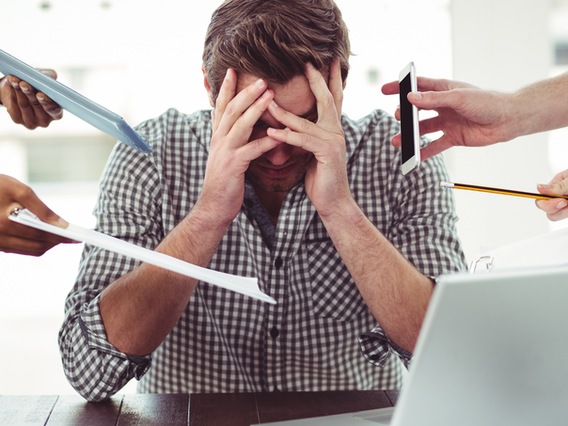Overview
When we’re overwhelmed or stressed, self-care is more important than ever! But it’s not always easy to find the time or energy we need to care for ourselves. So, read on for tips on practicing self-care when you’re overwhelmed.
Are you feeling overwhelmed? Is your stress level rising? If so, you’re not alone! Most people are facing increasing levels of stress, worry, and uncertainty and need to find effective ways to cope and stay emotionally healthy.
Perfectionists have a hard time prioritizing self-care. In this article, learn about self-care for perfectionists and ways to reduce feeling guilty or selfish when you do things for yourself.
Perfectionism makes it hard to practice to self-care.
Perfectionists are more concerned with goals and accomplishments than with our own wellbeing. Sometimes, we’re so busy that we don’t even realize that our need to please people, avoid criticism, and prove we’re “good enough” is destroying our mental and physical health.
are you a perfectionist?
Perfectionists have impossibly high standards for themselves – and sometimes for others, too. We expect ourselves to excel at everything, achieve our goals effortlessly, and always be agreeable. And we derive our self-worth from our accomplishments, which means we’re constantly correcting and perfecting, seeking external validation, and trying to prove our worth. This is a stressful way to live.
PERFECTIONISM GETS IN THE WAY OF SELF-CARE
Self-care can ameliorate the effects of stress and prevent perfectionism from negatively impacting our physical and mental health, but as perfectionists, we tend to feel guilty about doing things for ourselves—anything that isn’t a direct line to achieving a goal, meeting someone’s expectations, or getting more done.
Self-care doesn’t fit our image of perfection; we think perfect people are self-sacrificing, low-maintenance, don’t-need-anything types who can run on fumes and still get the job done. Because we have such unrealistic expectations of ourselves, we tend to underestimate our need for self-care and feel guilty about needing to rest, set boundaries, nurture our relationships, or have fun.
But the reality is that we all need self-care. We have to tend to our physical, emotional, and spiritual needs in order to stay healthy and live a life that’s fulfilling.
Another challenge perfectionists face with hobbies is our tendency to turn hobbies and games into competitions and situations where we feel compelled to excel. So, we might take a casual weekend soccer game and focus on winning, playing by the rules, or micromanaging the game—rather than just having fun.
Or we take a painting class with a friend, and instead of going with the flow, we want our painting to be exactly like the example. This can suck the fun right out of activities that are meant to be low-key opportunities to kick back, relax, and bond with our friends and family.
WHAT DO YOU DO WHEN YOU’RE OVERWHELMED AND STRESSED?
When we feel overwhelmed, many of us revert to unhealthy coping patterns and bad habits, like overeating, drinking, and zoning out in front of the television. And while these aren’t the best ways to take care of ourselves when we’re overwhelmed and stressed, it’s completely understandable.
When we’re mentally, emotionally, and physically depleted, we don’t have any bandwidth left to think of and implement healthy forms of self-care. So, we revert to the fastest and easiest ways to comfort ourselves – things that we know will immediately give us some relief, like eating a bag of chips or drinking a bottle of wine. They quickly provide comfort, numbing, and respite from our troubles, but they aren’t actually going to help us cope and build resiliency!
We all know that drowning our problems in potato chips and wine isn’t actually going to help – and if we use them repeatedly, they will cause additional problems. Potato chips and wine aren’t real self-care.
WHAT IS SELF-CARE?
Self-care is an activity that you do to care for yourself, to improve your physical, emotional, or spiritual health. Acts of self-care can include going to bed on time, ending a phone call with a verbally abusive caller, writing in your journal, meditating, or going to the dentist.
As you can see, self-care isn’t just pampering yourself. In fact, self-care isn’t always enjoyable – it’s the stuff we need to do to keep ourselves healthy, so we can be our best selves.
Self-care can be a preventative activity that we do, to stay healthy, like exercising or eating healthfully.
We also need to practice self-care in response to stress. And the more stress we are under, the more self-care we need. For example, if your spouse is in the hospital, you need to care for yourself in some additional ways beyond your regular preventative self-care routine. During this stressful time, your self-care might include praying in the hospital chapel, calling a friend, asking your sister to help watch your children, and so forth.
WHAT DO YOU NEED WHEN YOU’RE OVERWHELMED AND STRESSED?
Of course, practicing healthy self-care is easier said than done. It can feel like one more thing to do when you’re already depleted. And, for some, it can feel selfish to do something for yourself when a loved one is sick, you can’t pay your rent, or our country is in crisis. However, self-care isn’t selfish, it’s essential to your emotional and physical health.
When you feel overwhelmed or stressed, your mind and body are telling you that something is wrong, that you need to attend to your needs and rebalance yourself.
When you feel overwhelmed or stressed, what do you need? The answer will be different at different times, but you might need rest, emotional support, or to quiet your mind and stop worrying. Once you’ve identified what you need, you can figure out how to meet that need. For example, if you need rest, you might take a nap, or ask your partner to do the shopping so you can have a break, or you might call out sick from work.
When we’re under a lot of stress, our minds are overloaded and it’s hard to muster the extra energy and brain-power that we need to check-in with ourselves, find out what we need, and identify healthy forms of self-care. So, we want to make this process as easy as possible. Use the tips below to help you.
TIPS FOR PRACTICING SELF-CARE WHEN YOU’RE OVERWHELMED AND STRESSED
- Make a list of self-care activities that might help you when you’re overwhelmed or stressed. Keep this list somewhere handy, like on your phone or next to your bed. You want to be able to access this list easily, so you don’t have to come up with new ideas when you’re already overwhelmed.
- Remember that self-care includes both what you do and what you don’t do. For example, self-care can be adding exercise or it can be limiting how much time you spend on social media or declining an invitation.
- Try to maintain your regular healthy habits and self-care practices, such as exercise, getting enough sleep, hobbies, and so forth.
- Ask yourself: How do I feel? What do I need?
- If you use an unhealthy coping strategy, give yourself some grace, and move on. There’s no need to beat yourself up for smoking a cigarette when you’re in crisis, even if you quit ten years ago. Forgive yourself and make a plan to meet your needs in a healthier way.
- Self-care is essential, it’s not a luxury or something to do if you have time.
- Remember, the more stressed and overwhelmed you feel, the more self-care you need.
SELF-CARE IS HEALTHY, BUT NOT ALWAYS FUN
Self-care is often confused with leisure, self-indulgence, or anything that’s enjoyable. In fact, self-care isn’t always enjoyable: going to the dentist is a form of self-care, because we’re taking care of our health, but it’s not particularly enjoyable. And conversely, not all enjoyable activities are self-care.
Self-care is something that’s good for us, so eating a bag of potato chips at the end of an excruciating day may be a treat, but it’s not really self-care, because it’s not a healthy way to take care of yourself, and it’s not going to truly restore your physical or emotional energy.
This isn’t to say that we need to make healthy choices all the time. We’ve all mindlessly eaten a bag of chips while binge-watching Netflix. It’s fine for most of us to do this occasionally, and we don’t need to criticize ourselves for it. We should just recognize that it’s not quality self-care. Our efforts to practice self-care don’t have to be perfect. Self-care is more about progress than perfection.
WHAT DO YOU DO WHEN YOU’RE OVERWHELMED AND STRESSED?
When we feel overwhelmed, many of us revert to unhealthy coping patterns and bad habits, like overeating, drinking, and zoning out in front of the television. And while these aren’t the best ways to take care of ourselves when we’re overwhelmed and stressed, it’s completely understandable.
Take inventory of how you have been dealing with your triggers when you feel overwhelmed. Try practicing the tips for self-care and you will be well on your way to minimizing anxiety and stress. Remember, its okay to not be “perfect” all of the time.



